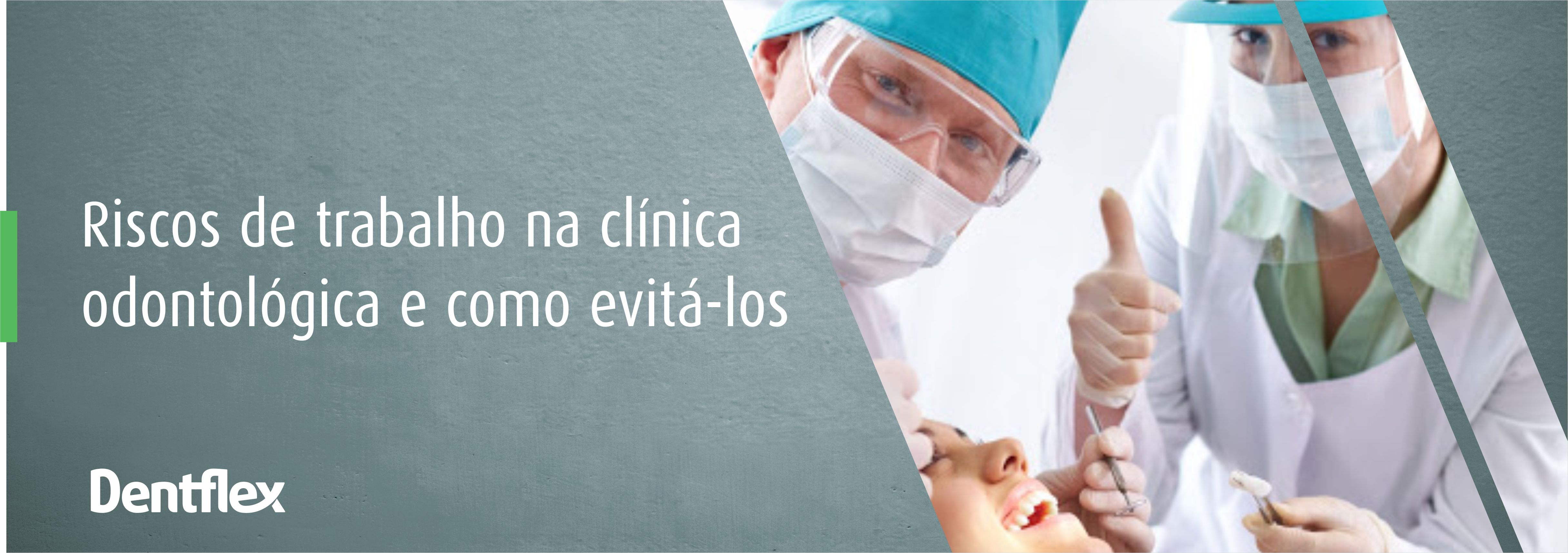Work hazards in the dental clinic and how to avoid them

The employees of your dental clinic are exposed daily to a series of professional risks specific to the dental segment, with consequences and dangers for your health. Through preventive measures, the dental clinic is obliged to provide employees with all the necessary resources to minimize the effects of these casualties inherent to the profession.
Legislation on safety and health at work establishes that every professional and entrepreneur is responsible for his own integrity and that of his employees. The dentist must be aware of the importance of ensuring his own safety, that of the patient and his team.
The purpose of this article is to make dental clinic employees aware of the illnesses and accidents inherent in their work and offer some guidelines aimed at avoiding their occurrence as much as possible.
Physical hazards
They are those that arise due to the use of the clinic's facilities and equipment, such as falls on the same or at different levels, damage caused by instruments and devices or electrical risks.
In order to prevent accidents, it is necessary to maintain a good organization and cleanliness of the clinic's furniture and objects, as well as to have adequate signage for the different work areas, indicating through spaces of warning signs the spaces or areas of greatest risk.
Likewise, it is essential to work at an adequate work pace, which allows the employee to pay attention to each of the tasks performed.
To avoid electrical accidents, it is necessary to restrict the continued use of devices that can lead to electrical overloads, and to activate the drills directly inside the patient's mouth, never outside.
Other physical risks to which dental professionals are exposed due to the use of dental clinic equipment are:
- Ionizing radiation: derived from the use of X-ray devices. Specific programs for safety and protection against radiation must be defined.
- Environmental noise: damage to the ears can result from constant exposure to the sound of rotating material. To minimize this risk, it is advisable to have soundproof walls and use ear plugs.
- Risk of using a laser: this instrument can cause eye damage. Surgical lasers also release gases containing carcinogens. Prevention consists of using masks specially indicated for the use of the laser, as well as avoiding the aspiration of toxic fumes.
- Light: the photopolymerizers emit a visible blue light. Its main danger is photoretinitis, an irreversible damage to the retina, caused by constant work with this tool. To avoid damage, it is especially important to wear eye protection and not to look directly into the light.
- Foreign bodies in the eyes: in the dental office it is likely that the impact of a foreign body in the eyes, such as resin or amalgam, may occur if adequate eye protection is not used during the working day.
Chemical hazards
In the dental office, there are many chemicals hazardous to health that can cause damage by direct action or indirect sensitization.
Among them are antiseptics, anesthetics or mercury. The dangers to which the worker is exposed are burns, dermatitis, asthma and brain, respiratory or kidney injuries, among others. It is important that dentists use the necessary protection for the use of these products, in addition to verifying that they have adequate labeling and composition.
The most effective safety measure is ventilation, as it reduces the concentration levels in the air. It is also necessary to limit working hours with dangerous products.
Another preventive measure is the use of powder-free latex gloves, to minimize the number of particles that are aspirated and that can constitute a health hazard.
Biological hazards
Dental professionals are in contact with blood and potentially infectious organic fluids, capable of transmitting bacteria, viruses and fungi, eventually giving rise to a cross infection.
To avoid any contagion, it is necessary to follow a series of prevention rules:
- Vaccination of professionals: immunization against measles, rubella and hepatitis.
- Personal hygiene standards: it is necessary for the team to remove rings or jewelry before starting work and wash your hands before and after each treatment, rubbing them for at least twenty seconds with antiseptic soap. If the specialist has any wounds or cuts, it is necessary to cover them before starting the workday.
- Use of protective barriers: wear gloves, glasses and a nose and mouth protector.
- Handling of instruments: be extremely careful when working with the instruments to avoid cuts. Dispose of sharp residues in hard plastic containers.
Work overload hazards
In the dental profession it is common to make excessive efforts at the physical and mental level, as a result of long hours of work and decision-making that affect people's health.
Physical overload hazards
Using several devices and maintaining the same position for hours can cause inflammation, pain and contractures in the back, upper limbs, hands and wrists.
To avoid these damages, it is necessary to perform muscle stretches specially indicated for dental professionals, to have a suitable dental chair and to respect the rest times.
A correct working posture allows the specialist to keep the feet flat on the floor, with the arms close to the body, the forearms flexed and aligned with the hands and a straight line view, without the need for any twisting of the neck.
Mental overload hazards
The great responsibility of the profession makes many employees of dental clinics feel anxiety, stress, headache, digestive disorders or depression, among other damages.
To avoid these work risks, it is necessary to have rest periods between the care of each patient and to organize daily activities in the clinic to avoid overly repetitive tasks.
At the social level, cooperation between colleagues and a good working environment are key factors.
On a personal level, following a balanced diet and exercising regularly helps to avoid and better cope with work overloads.
Source: Dentalis sempre à mão. Available at: https://www.dentalis.com.br/blog/riscos-de-trabalho-na-clinica-odontologica-e-como-evita-los. Access on: 05/50/2021.
